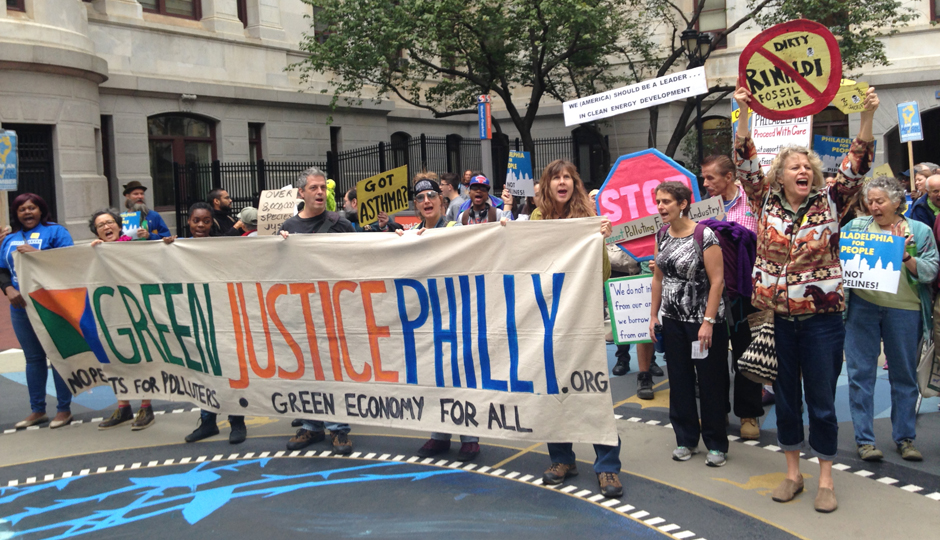Philly As Energy Hub? Not So Fast Says New Environmental Group
While many are arguing that Philadelphia can transform into an energy hub that takes advantage of cheap gas from the Marcellus Shale, a new environmental group has emerged to fight the plan.
Called Green Justice Philly, the organization launched Wednesday with a rally in Center City calling for green energy initiatives and cautioning city leaders about environmental consequences. It’s a coalition of more than 20 different organizations including the Clean Air Council, Delaware Riverkeeper Network and the Food & Water Watch.
The organization is particularly concerned with Philadelphia Energy Solutions, the oil refinery in South Philadelphia. Green Justice Philly says the company “emits 72 percent of the city’s major source toxic air pollution” and “has consistently disregarded regulations designed to protect our air, water, and public health, and has built its business model around simply paying fines for these violations instead of spending money to prevent them.”
A PES spokesperson did not immediately respond to a request for comment.
StateImpact reports that Green Justice Philly sent a letter to Philadelphia City Council “asking the 17 members to consider legislation that would prevent ‘serious violators of air and water regulations from expanding by obtaining new permits from the city.’ ”
Meanwhile, the next mayor will certainly have a big say in how this shakes out. But odds-on-favorite Jim Kenney recently offered this lukewarm statement to the Philadelphia Inquirer: “I know it’s two words, energy hub. If someone could explain it to me, because there’s so many different components to it. . . . Nobody has really shown me a design of what goes where, or what is intended to go where.” He went on to say: “I think the ‘energy hub’ issue automatically sends people to oil trains and asthma. It’s like there is no middle ground there for some folks. I think the government’s responsibility, when it comes to environmental protection and job protection in a city that has a 26 percent poverty rate, I think somewhere you have to find the middle ground. I don’t know where that middle ground is at the moment.”
Meanwhile, Green Justice Philly is also hoping to educate people about oil train safety — especially in the wake of the uptick in oil train crashes recently. (Perhaps the most notable was a rail disaster in Lac-Mégantic, Quebec that killed 47 people in 2013.)
“Two to three times a day mile-long trains carry dangerous Bakken Shale crude oil through Philadelphia and the volumes are expanding; the crude by rail yard at Philadelphia Energy Solutions can handle four trains every day — each carrying over 100 tank cars and up to 3.6 million gallons of crude oil. The largest freshwater port in the world, the Delaware River has huge shipping capacity and has been used to ship oil for over a century. But until the domestic crude frenzy took hold in recent years, oil refining and traffic were on the way out,” said Green Jusitce Philly on its website. It went on to say “here in Philadelphia, we wouldn’t have time to get away from an explosion and millions of dollars in devastating damages could occur should there be a derailment.”



